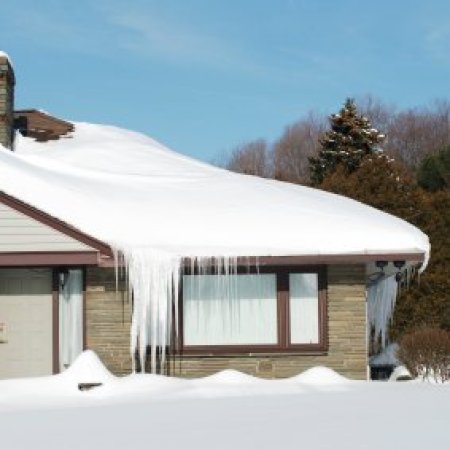The Boy Scouts have it right-always be prepared. After a recent early season snow storm knocked out power for days in the mid-Atlantic, families emerged from the darkness with the realization that they weren't as prepared for a disaster as they thought. Yet, it doesn't take a hefty investment or a lot of time to prepare your family to comfortably weather the winter storms.
For those who live in suburban or urban areas, the idea that food might become inaccessible seems unreal. Yet, something as simple as a heavy snow will snap power lines and close roads for days, closing all fast food and grocery locations. Do you have enough food if you're trapped in your house for three days without power?
It's advised by www.ready.gov that each person store three gallons of water and enough non-perishable food for three days. The best plan is to dedicate a plastic tote or other storage bin for your emergency foods. Since they carry a long shelf-life, there's nothing required other than a yearly inventory and replenishment. Don't forget to keep a manual can opener stashed in the bin as well.
To stock up for your emergency kit, watch grocery store sales. Stores often put bottled water on sale in the summer months, so fill your shelves then. It's a good idea to save some plastic milk/water jugs throughout the year and fill them with tap water for washing in the event that you lose your water during the storms. You can always use the water for houseplants, replenishing it when the supply goes low or a storm approaches.
Know what your stockpile needs, and grab it when it's on sale or offered as a coupon. The 10/$10 sales that require all ten items to be purchased are a great time to build your emergency kit. Good food staples include: canned soup, granola bars, mixed nuts, powdered milk, instant coffee, canned tuna, canned fruit, peanut butter, and Chef Boyardee-type products. These products are easily heated and can be eaten cold if necessary. Don't forget to keep extra pet food and a gallon of water a day for each dog/cat.
There is no need to pay $10 or $20 for a sparsely packed first aid kit; build your own. Load it with an antiseptic spray, bandages, gauze, gauze tape, butterfly bandages, and a rolled bandage. All of these items can be found at dollar/bargain stores. Also keep your medicine cabinet stocked, and don't allow it to run low. Do you have a week's supply of your prescriptions or over the counter pain relievers? Are your inhalers filled? Do you have the essentials for winter colds? These are important questions to answer before the storm hits and the roads close.
Other items that should be "overstocked" during the winter months are: moist wipes, feminine products, matches, baby products, candles, bathroom tissue, and facial tissues. Your emergency stockpile isn't the place to be brand loyal, so grab whatever is at the highest sale and offers the most coupons.
Also, keep plenty of plastic garbage bags in the house in case you need to create makeshift raincoats or tarps. Duct tape or packing tape should be kept on your emergency shelf as well as a box of matches sealed in a plastic bag.
Forget the pricey investment of a generator (though they can be nice). Instead, look at what you have. Do you have decorative oil lamps in your home? They will light up a room nicely for less than $20 if you keep extra oil and wicks on hand. What about candles? While you more than likely purchased them to add fragrance to your home, they can provide ample light to a room, especially tapers and candelabras. Great buys on candelabras and candles can be found during the holiday season.
Keep more than enough batteries for a radio and your flashlights. Every bedroom and level of the home should have a flashlight in a reliable, set location at all times. You don't need to fumble around in the dark to find a flashlight. Consider investing in an extra storage container to keep extra fuel on hand.
In spring, stores will mark down kerosene and propane heaters. This is your time to snatch them up and store them for emergencies. One kerosene heater will pay for itself after a weekend snow storm that takes out the power used to regulate your heat. Likewise, camping gear might be marked down throughout the year. Pick up a few items such as a camp stove, a coffee pot, and lanterns. These items will be invaluable to you if a storm hits in December.
Most of all, have a plan. www.ready.gov offers a variety of plans for emergencies.

Add your voice! Click below to comment. ThriftyFun is powered by your wisdom!
What nobody seems to realize is that if you live in an apartment, most of the time there isn't anyplace to store other than what you need for a couple weeks and I don't mean emergency food, I mean what you regularly use. I have plenty of sandwich meat and bread in my freezer. We also have cold cereal and milk on hand.
Add your voice! Click below to comment. ThriftyFun is powered by your wisdom!